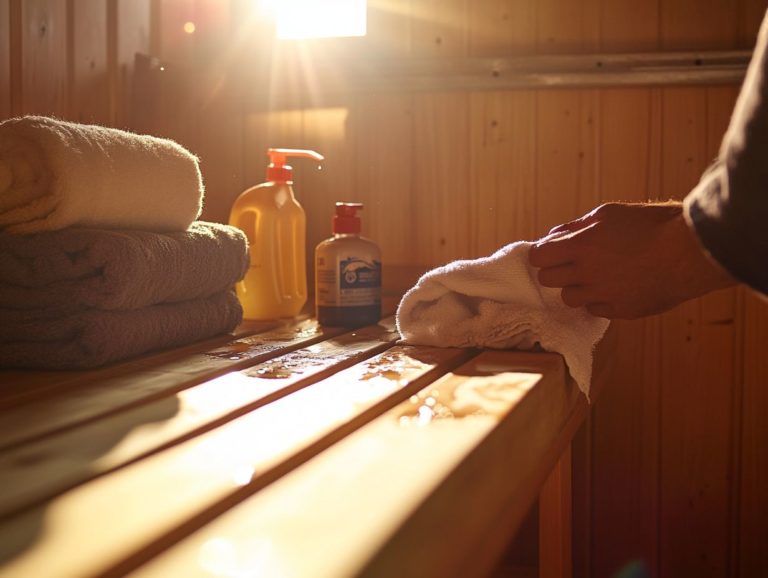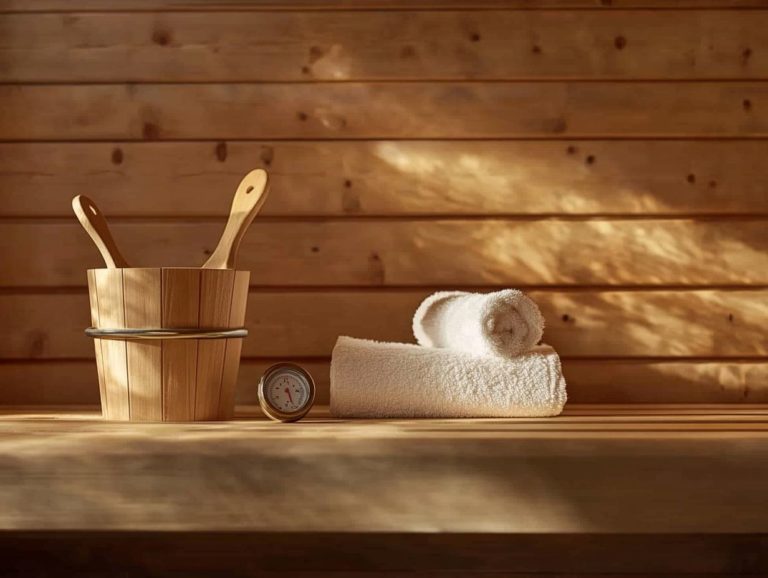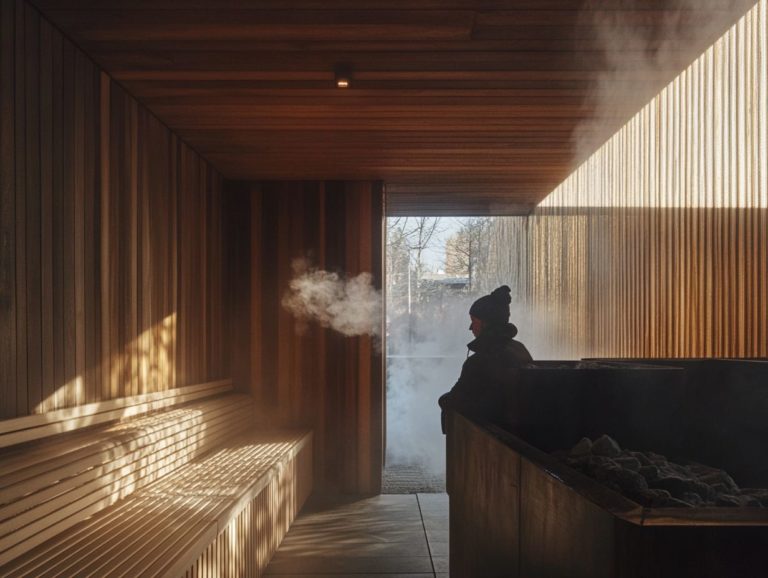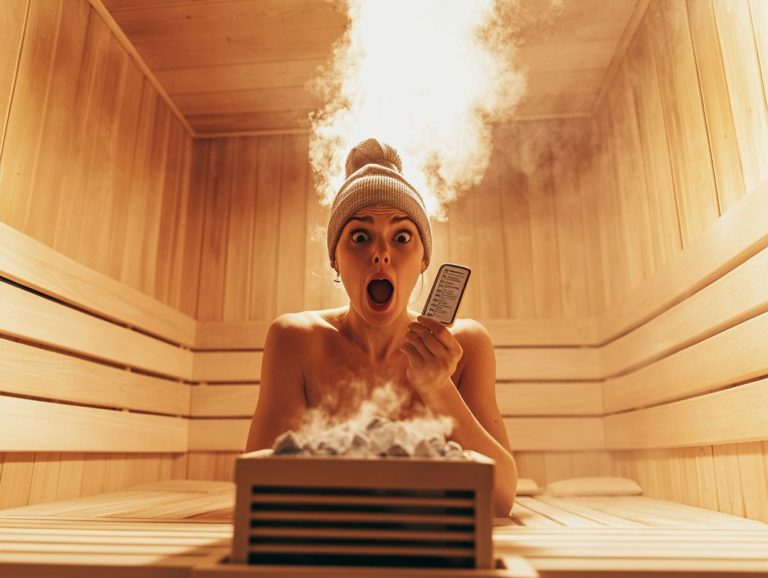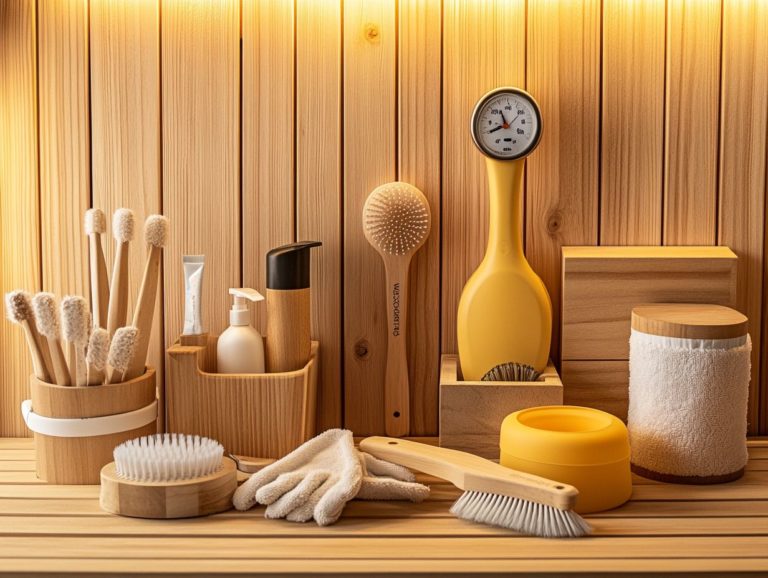How to Keep Your Sauna Odor-Free
Saunas provide a serene retreat, yet unpleasant odors can certainly detract from the experience. Recognizing the sources of sauna odor is essential for creating a delightful atmosphere.
This article delves into the various factors that contribute to that unique scent. It offers crucial tips for preventing it, from effective cleaning techniques to selecting the right materials. You’ll find all the knowledge you need to keep your sauna smelling fresh.
Uncover effective strategies to eliminate odors and ensure your spa remains a welcoming sanctuary.
Contents
- Key Takeaways:
- Understanding Sauna Odor
- Preventing Sauna Odor
- Removing Sauna Odor
- Tips for Maintaining an Odor-Free Sauna
- Frequently Asked Questions
- How can I prevent my sauna from developing a musty smell?
- What is the best way to clean my sauna and get rid of lingering odors?
- How often should I clean my sauna to keep it odor-free?
- Can I use scented oils or candles in my sauna without causing any odors?
- What measures can I take to keep my sauna smelling fresh?
- Can I use any type of wood in my sauna without causing a smell?
Key Takeaways:
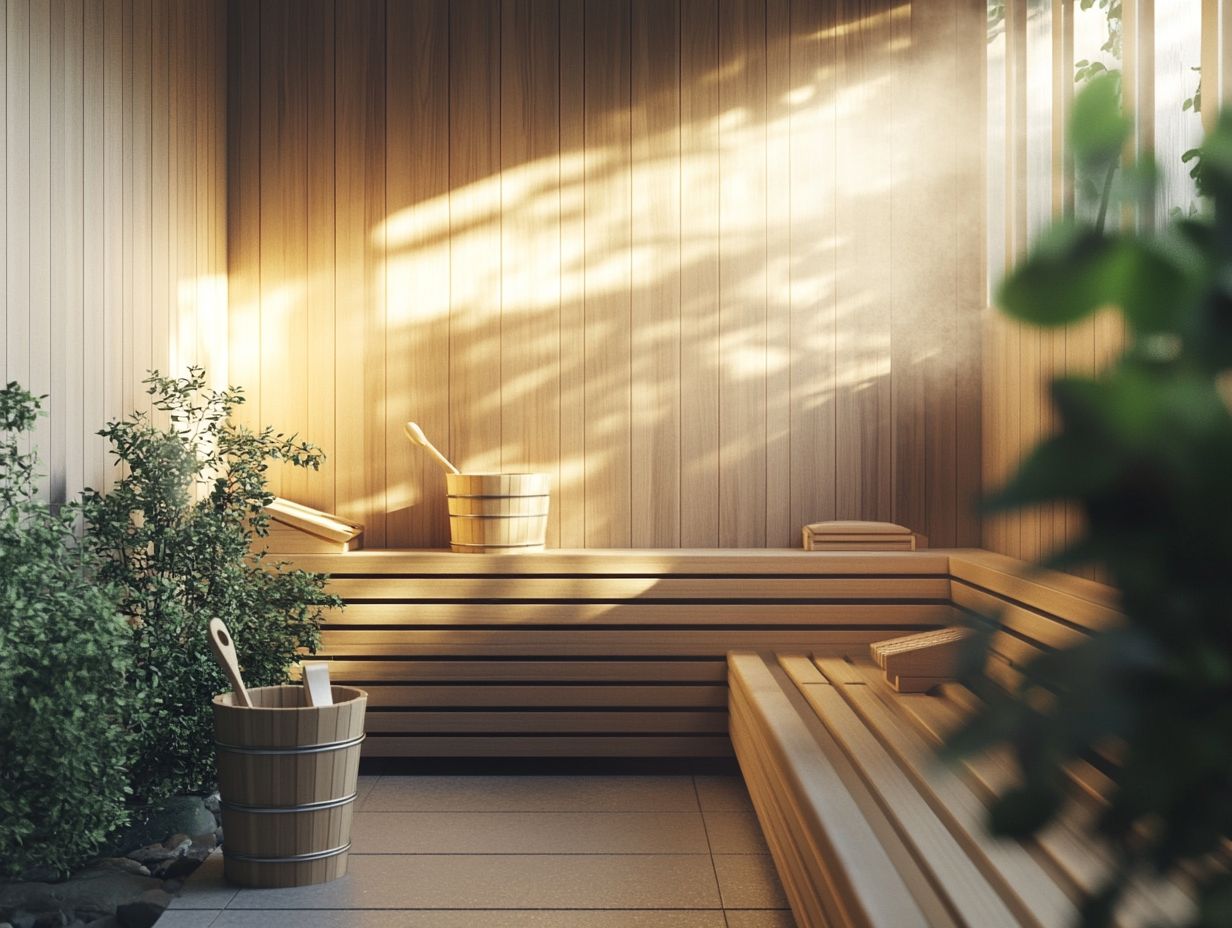
- Understand the causes of sauna odor to keep it fresh through regular cleaning and maintenance.
- Remove sauna odor by using effective cleaning methods and natural deodorizers like essential oils.
- Maintain an odor-free sauna by cleaning regularly and ensuring proper ventilation to prevent build-up of sweat, bacteria, and mold.
Understanding Sauna Odor
Understanding sauna odor is essential for you as a sauna owner who desires to create a pleasant and inviting experience. Unpleasant smells often stem from a blend of factors such as humidity, mold, and mildew.
These factors can thrive in the warm, moist environment if not properly managed. Body odor from sweat can add to the mix of unwelcome scents. Regular cleaning is crucial for maintaining a clean and enjoyable space.
By addressing these concerns, you ensure that your sauna remains a true sanctuary for relaxation and wellness.
What Causes Sauna Odor?
Sauna odor primarily stems from a mix of unpleasant smells caused by mold, mildew, and elevated humidity levels, coupled with the natural body odor released during sweating.
This unique blend can create an uncomfortable environment if left unchecked. In humid spaces like saunas, mold and mildew flourish on damp conditions and organic materials that may gather.
Your body naturally produces sweat, which can lead to body odor if you don t maintain proper hygiene. Regular upkeep is crucial; this includes ensuring adequate ventilation and conducting frequent cleanings to remove mold.
Use towels to soak up sweat. By addressing these factors, you can significantly enhance the overall hygiene and experience within the sauna.
Preventing Sauna Odor
Preventing sauna odor demands a proactive approach to maintenance. Set a regular cleaning schedule and ensure proper ventilation while employing effective cleaning strategies to maintain a fresh and inviting atmosphere.
Proper Cleaning and Maintenance
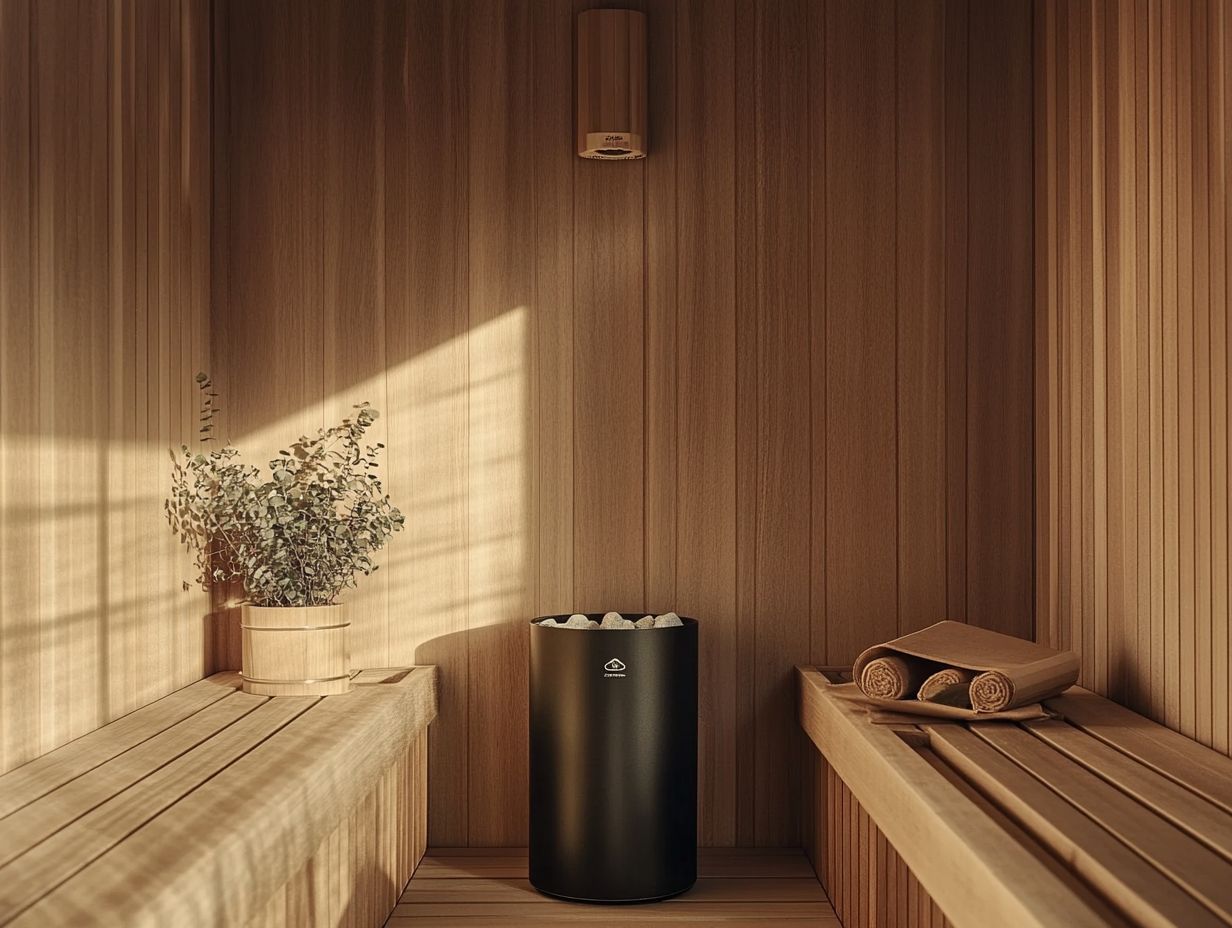
Proper cleaning and maintenance are essential for achieving an odor-free sauna experience. A thorough cleaning routine should incorporate suitable disinfectants and focus on sauna accessories.
An effective cleaning regimen not only elevates the overall atmosphere but also extends the lifespan of the sauna and its components. By methodically integrating various cleaning techniques like steam cleaning, which uses hot vapor to sanitize surfaces, you can efficiently eliminate stubborn bacteria and odors. Additionally, understanding how to maintain your sauna’s warranty can help protect your investment.
Disinfectants are pivotal in this process, ensuring that harmful pathogens are eliminated, thus fostering a safe and healthy environment for users. Don’t overlook the maintenance of sauna accessories such as benches, towels, and wooden elements; routine inspections and proper cleaning will keep them in prime condition.
Take action now to implement these tips for a better sauna experience!
Choosing the Right Wood for Your Sauna
Choosing the right wood is crucial for effective heat distribution. It also maximizes performance and reduces maintenance issues like unpleasant odors and decay.
Different types of wood enhance the aesthetics of your sauna. Cedar is favored for its resistance to decay and pleasant aroma.
Hemlock is popular for its affordability and durability, providing excellent heat retention without overpowering scents.
Brands like Finnleo and Harvia often use these woods, focusing on maintenance to ensure longevity and consistent performance. By understanding the unique qualities of each wood type, you can significantly enhance both the usability and enjoyment of your sauna.
Removing Sauna Odor
To effectively eliminate sauna odor, employ a blend of proven cleaning methods alongside natural deodorizers. Consider using vinegar, baking soda, and activated charcoal to neutralize unpleasant smells. This ensures your sauna remains a pristine and welcoming environment.
Effective Cleaning Methods
Effective cleaning methods for your sauna involve using vinegar, baking soda, and various cleaning products that kill germs. These work together to eliminate stubborn odors and uphold hygiene.
Each natural agent brings unique properties to the table. Vinegar excels at breaking down mineral deposits while neutralizing odors, making it a favorite among cleaning enthusiasts.
Baking soda serves as a mild abrasive and deodorizer. Create a paste with baking soda and water, apply it to trouble spots, and let it sit before scrubbing it away.
For practical disinfecting, a blend of vinegar and water in a spray bottle is ideal for daily maintenance. Regularly applying this mixture to crevices and surfaces keeps your sauna fresh and inviting, ensuring a rejuvenating experience every time.
Using Natural Deodorizers

Using natural deodorizers like eucalyptus, lavender, peppermint, and lemon can truly elevate your sauna experience while effectively banishing unwanted odors.
These essential oils not only purify the air but also transform your sauna into a fragrant retreat that enhances relaxation. Eucalyptus, with its refreshing menthol aroma, is especially effective at clearing your sinuses and promoting deeper breathing.
Lavender introduces a calming floral note that helps melt away stress and boosts overall tranquility.
Meanwhile, peppermint invigorates your senses, delivering a cool sensation that can lift your mood and energy levels. And don t forget about lemon its zesty fragrance freshens the space and brings antiseptic properties, ensuring a clean atmosphere that enhances your wellbeing.
Tips for Maintaining an Odor-Free Sauna
To keep your sauna odor-free, embrace a blend of regular cleaning, effective ventilation, and the use of fresh towels and sauna cushions. This approach promotes a hygienic environment and enhances your overall sauna experience, making it a true sanctuary for relaxation and wellness.
Regular Cleaning and Maintenance
Regular cleaning and maintenance are essential for preserving a pleasant sauna atmosphere. Establish a consistent cleaning routine to tackle odor and hygiene concerns.
Implementing a regular cleaning schedule significantly enhances the overall experience, ensuring the environment remains inviting and free from unpleasant smells. This goes beyond a mere wipe-down; it involves deep cleaning tasks such as scrubbing surfaces, sanitizing benches, and ensuring proper ventilation.
To effectively combat odor issues, consider incorporating essential elements like:
- Clean regularly with natural, non-toxic cleaners
- Check for mold growth
- Regularly change water in any adjacent containers
Encouraging sauna users to shower before entering can also play a vital role in maintaining the sauna’s cleanliness and freshness.
Embrace these tips for an unforgettable sauna experience!
Proper Ventilation
Proper ventilation is essential for your sauna. It ensures that air circulates effectively and humidity levels are kept in check.
This not only enhances your overall sauna experience but also fosters a hygienic environment. When air flows freely in the space, it prevents stagnant air, which can lead to unpleasant odors and unhealthy conditions.
Managing humidity is important. Excess moisture can lead to the growth of mold or mildew, complicating your relaxation.
Regularly circulating fresh air helps you find the right balance in moisture levels. This way, you can enjoy your sauna sessions without distractions from unwanted smells.
With the right ventilation, you can fully immerse yourself in the soothing warmth and relaxation that saunas are meant to provide.
Frequently Asked Questions

How can I prevent my sauna from developing a musty smell?
To keep your sauna odor-free, ventilate it after each use. This prevents moisture buildup and musty smells.
What is the best way to clean my sauna and get rid of lingering odors?
The best cleaning method is to use a mild soap and water solution. Avoid harsh chemicals, as they can leave lingering odors.
How often should I clean my sauna to keep it odor-free?
It is recommended to clean your sauna at least once a week. If you use it frequently, consider cleaning it more often.
Can I use scented oils or candles in my sauna without causing any odors?
Yes, you can use scented oils or candles, but choose natural and non-toxic options. Use them sparingly to avoid overpowering smells in the small space.
What measures can I take to keep my sauna smelling fresh?
In addition to regular cleaning and proper ventilation, consider adding natural odor-absorbing materials like charcoal or baking soda. These absorb unwanted odors and keep the air fresh.
Can I use any type of wood in my sauna without causing a smell?
No, use the right type of wood to prevent unpleasant odors. Cedar, pine, and spruce are popular choices due to their natural antibacterial properties and pleasant aroma.
Avoid pressure-treated or chemically-treated wood, as these can release harmful fumes.

